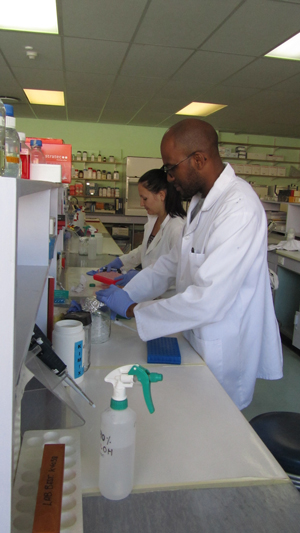
We have several projects on human TB susceptibility as TB remains one of the leading causes of death worldwide. Moreover, of the 9 million people who developed TB disease globally in 2013, 25 % of the affected were in Africa. South Africa, in particular is heavily burdened by TB, with close to 860 people out every 100 000 affected by this infectious disease. It is crucial to study TB susceptibility because we know that a lot of people get infected with
M. tuberculosis as a result of living in this TB endemic area, but the vast majority of the infected do not develop clinical TB disease. As resistance to infection relies on the immune system, which is largely determined by the host's genetic make-up, inter-individual variation in the immune response to mycobacteria plays a major role in determining the different clinical outcomes in infected people. Hence, we have research projects investigating the genetic underpinnings of TB. Given that a pattern of susceptibility to mycobacterial diseases occurs in some forms of PIDs, of particular interest to our research are conditions such as MSMD, CGD and SCID, which are examples of PIDs that are known to cause an increased susceptibility to mycobacteria. While many mutations that cause diseases like MSMD, CGD and SCID have previously been identified, a large number of affected individuals exist in whom no known gene mutation has been found. As Next-Generation Sequencing (NGS) involves the massive sequencing of several genes simultaneously, PIDDGEN also has projects employing the use of NGS Whole-Exome Sequencing (WES) to identify novel MSMD, CGD and SCID-causing mutations in affected individuals (and in some cases, their family members who might be carriers or also be at risk for a PIDD that may have an onset much later in life than when the testing is being done). We aim to use this knowledge to assist families with pre-symptomatic diagnosis with the option of carrier testing and prenatal diagnosis. In addition, we aim to develop a locally relevant 'panel' of PID genes for diagnostic purposes, and to increase insight into the biology of predisposition to TB.

